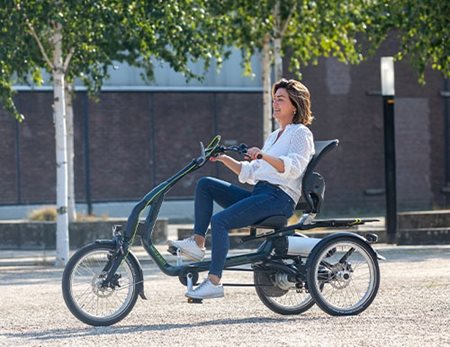Kids’ tricycles are more than just a fun ride around the block; they play a crucial role in boosting a child’s confidence and fostering their independence. These three-wheeled wonders provide a safe and exciting way for young children to explore their world and develop essential life skills.
Physical Development: Tricycles are fantastic tools for developing a child’s physical abilities. Riding a tricycle requires coordination between the hands and feet, improving fine and gross motor skills. Children learn to pedal, steer, and balance, all of which are fundamental for their physical development. The mastery of these skills gives them a sense of accomplishment, thereby boosting their self-esteem.
Risk-Taking and Problem Solving: Riding a tricycle comes with its challenges, such as navigating turns, avoiding obstacles, or figuring out how to pedal uphill. Children learn to take calculated risks and develop problem-solving skills as they encounter these hurdles. The confidence they gain from overcoming these challenges extends beyond the tricycle, helping them face and conquer other obstacles in life.
 Independence and Self-Reliance: Tricycles provide kids with a taste of independence. They can explore their surroundings, make choices about where to go, and discover new things on their own. This newfound autonomy fosters self-reliance, teaching children that they can do things by themselves, which is a crucial building block for their self-confidence.
Independence and Self-Reliance: Tricycles provide kids with a taste of independence. They can explore their surroundings, make choices about where to go, and discover new things on their own. This newfound autonomy fosters self-reliance, teaching children that they can do things by themselves, which is a crucial building block for their self-confidence.
Social Interaction: Riding tricycles can be a social activity. When children ride together, they learn to interact, negotiate, and share. These social interactions are essential for their emotional development and confidence-building. Learning to communicate and cooperate with others at an early age sets the stage for healthier relationships later in life.
Sense of Achievement: Every successful ride on a tricycle represents an achievement for a child. Whether it is mastering a tricky maneuver or completing a lap around the yard, these small victories add up to a sense of accomplishment. Children become proud of their abilities, and this pride instills a sense of confidence that carries over into other aspects of their lives.
Building Resilience: Riding a tricycle is not always smooth sailing. Children may fall or experience setbacks, but these experiences teach resilience. They learn that failure is part of the learning process and that they can get back on their tricycle and try again. This resilience becomes a valuable life skill, helping them tackle challenges with confidence as they grow older.
Emotional Well-being: Physical activity, like riding a tricycle, releases endorphins, which are known to improve mood and reduce stress. Children who enjoy their tricycle rides experience increased happiness and emotional well-being. This positive emotional state contributes to their overall confidence and self-esteem.
Family Bonding: Tricycle rides often involve family members. These shared experiences create strong bonds between parents and children, reinforcing a child’s sense of security and self-worth. The support and encouragement they receive during kids tricycle adventures further boost their confidence.
In conclusion, kids’ tricycles are more than just toys. They serve as powerful tools for enhancing a child’s confidence and independence. Through physical development, problem-solving, risk-taking, and social interactions, children learn important life skills while having fun. The sense of achievement, resilience, emotional well-being, and family bonding that tricycles foster contribute to a well-rounded, confident child who is ready to take on the world, one three-wheeled adventure at a time. So, when you see a child pedaling around on their tricycle, remember that they are not just riding; they are on a journey to independence and self-assuredness.
Categories: Shopping